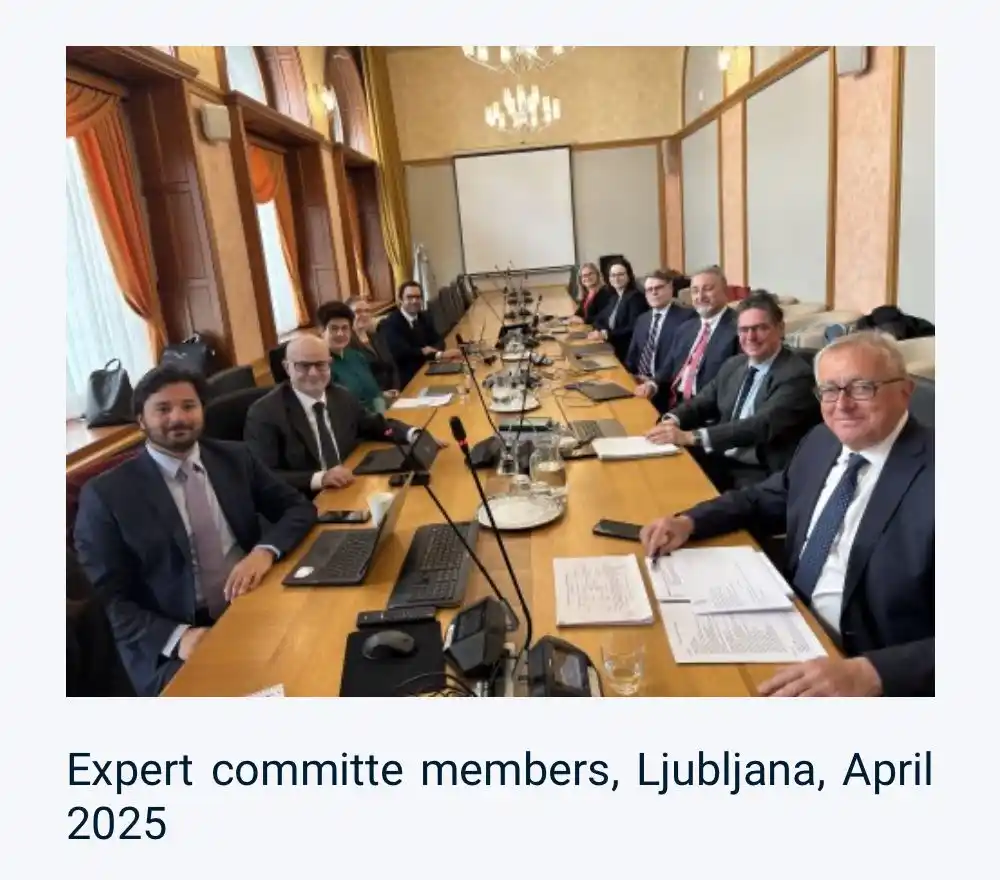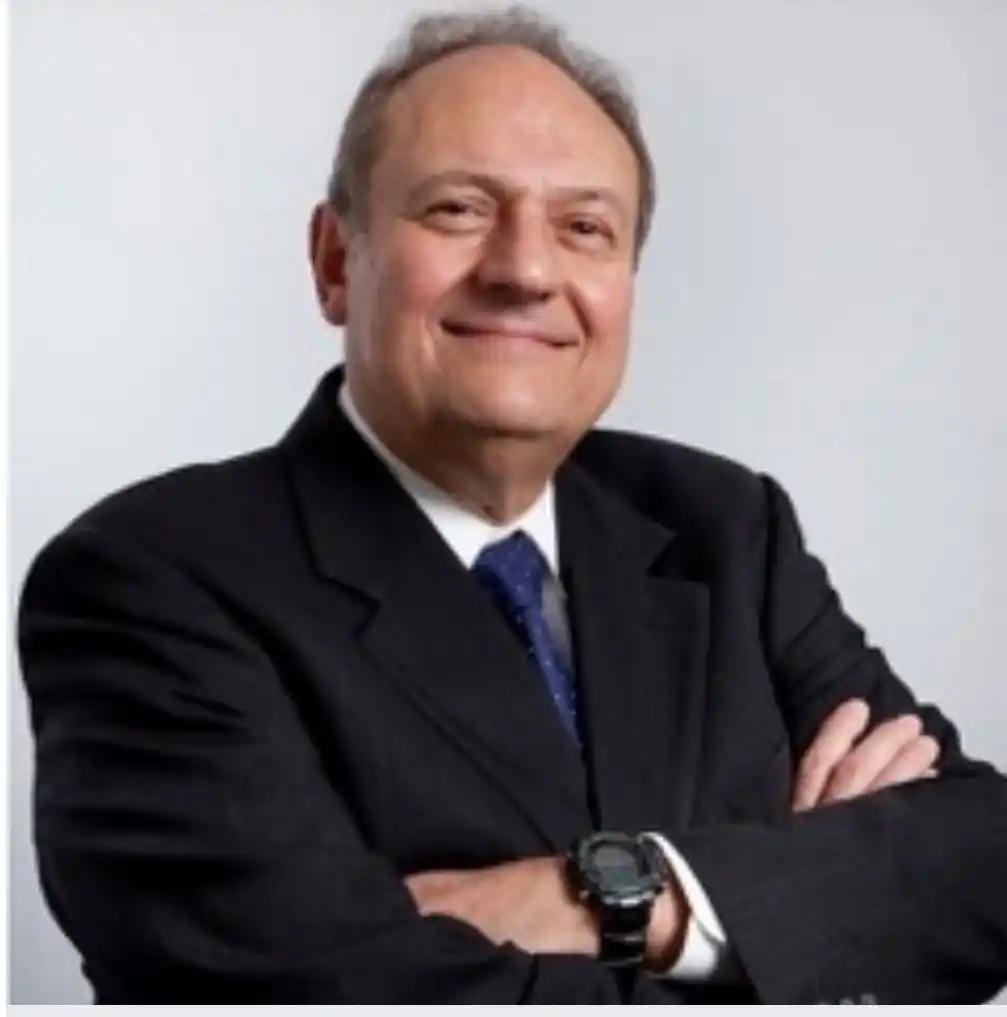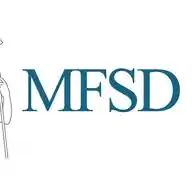
MFSD 📰 Cooling-Off
56 subscribers
About MFSD 📰 Cooling-Off
📲 Delivering news and tips on out-of-court business dispute resolution and us. 🌐 Web: https://www.mfsd.it/ ⚡️URS: https://www.mfsd.it/sospensione-rapida-domini-generici 📧 [email protected] 🇮🇹.it: https://www.mfsd.it/dispute-domini-it 📧 [email protected] 🔁 Digital Services: https://www.mfsd.it/en/arbitrato 📧 [email protected] 🤝 Mediation: https://www.mfsd.it/mediazione 📧 [email protected] 👩🏫 Academy: https://www.mfsd.it/copia-di-formazione 📧 [email protected] 👥 Stackholders Engagement: https://www.mfsd.it/contatti 📧 [email protected] 🧾 Accounting and Billing 📧 [email protected] 📺 Video: https://www.youtube.com/user/MFSDTV 🎙️Podcast: https://open.spotify.com/show/6SCegWILRwc5WqFZaIugjK Linkedin: https://www.linkedin.com/company/mfsd-srl/ Facebook: https://www.facebook.com/share/15MpFqr6zs/?mibextid=wwXIfr
Similar Channels
Swipe to see more
Posts

📉 Giustizia civile: il traguardo del PNRR si allontana 😥 I dati 2024 fotografano un rallentamento nei tribunali italiani: -0,4% nei tempi del primo grado rispetto al 2023, ancora troppo poco per centrare l’obiettivo del -40% entro il 2026. ⚖️ Crescono i ricorsi, soprattutto in materia di #cittadinanza e #immigrazione, e le pendenze aumentano. Mentre si accelera sullo smaltimento dell’arretrato, rallenta la gestione dei nuovi processi. 🤝 In questo contesto, rafforzare la #mediazione civile e commerciale non è solo una via alternativa, ma una leva strategica per deflazionare i carichi giudiziari, ridurre i tempi e favorire soluzioni più rapide ed efficaci. 📌 Una giustizia più efficiente non è solo una scadenza PNRR, ma un impegno strutturale per la tutela dei diritti e la competitività del Paese. ©️ Il Sole 24 Ore #GiustiziaCivile #PNRR #ADR #Mediazione #LegalReform #AccessoAllaGiustizia #Tribunali #ProcessoCivile #LegalEfficiency #GiustiziaComplementare
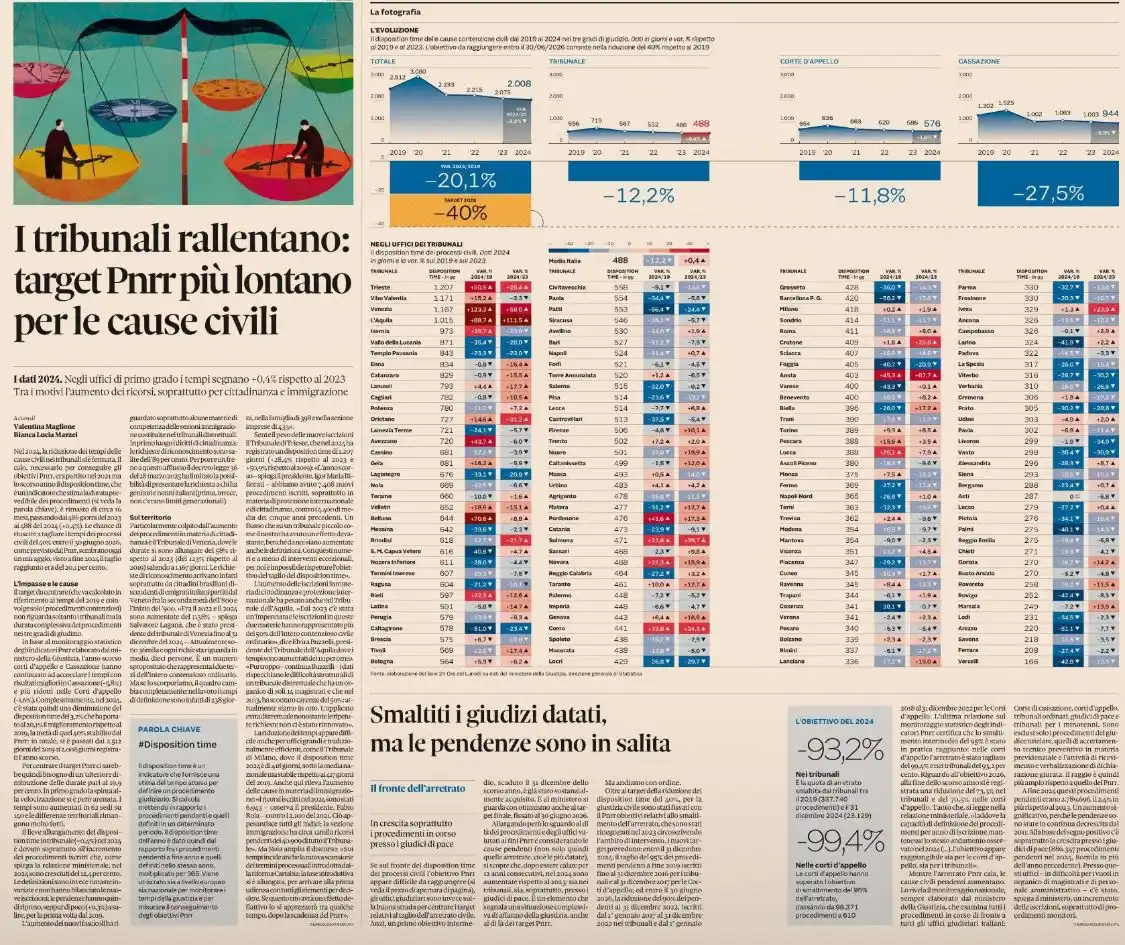

⚫️ It is with profound sadness that we share the passing of Professor Alberto Piergrossi - towering figure in the Italian and international legal community, and a mentor whose wisdom and humanity left an indelible mark on all who had the privilege to work alongside him. Professor Piergrossi was the founding partner and Chairman of PIERGROSSI Studio Legale in Milan, a firm he established in 2009 after decades of leadership at Eversheds Piergrossi Bianchini, which he co-founded in 1975. His legal acumen spanned commercial and corporate law, intellectual property, insolvency, and international arbitration. He was a respected litigator, mediator, and arbitrator—regularly appointed in complex domestic and cross-border disputes. He also served as an International Mediator for MFSD, and contributed to the work of UNCITRAL: United Nations Commission on International Trade Law Working Group III on Insolvency (Conciliation and Arbitration). Most recently, he joined the Italian base of Aria Grace Law CIC, continuing to bring his wisdom and expertise to an international and socially driven legal community. His academic contributions were equally distinguished. A summa cum laude graduate of the University of Milan (1963) and LL.M. graduate of Harvard Law School (1967), he served as Professor of Civil Procedure at the University of Milan and taught Private and Procedural International Law at the University of Siena - Italy (Dep.t of Law and Business Studies). In 1968, he was a Teaching and Research Assistant at Stanford Law School and in 2005, he lectured at Harvard Law School. Professor Piergrossi was a prolific author and a sought-after speaker at international legal forums. He served as President of the Harvard Law School Association of Europe from 2004 to 2007 and was an active member of numerous legal associations, including the International Bar Association and the International Trademark Association (INTA). Beyond his formidable intellect and professional achievements, Alberto was a man of deep integrity, generosity, and warmth. He inspired generations of lawyers with his passion for justice and his unwavering commitment to excellence. His legacy endures in the countless professionals he mentored, the institutions he shaped, and the legal standards he helped elevate. Rest in peace, Professor Piergrossi. Caro Alberto, your wisdom, kindness, and vision will be deeply missed.

🔍 Public Consultation on PMAC’s Draft Arbitration Rules Now Open 📢 We are pleased to share that our Co-Founder and Director of Adjudicative ADR, Pierfrancesco C. Fasano, has contributed as a member of the Expert Committee to the study and drafting of the Arbitration Rules recently released by the Patent Mediation and Arbitration Centre (PMAC) of the Unified Patent Court (UPC) for public consultation. 💬 Engaging the Community in Shaping Procedural Standards As part of its preparatory phase, PMAC is actively involving users in the development of its procedural framework by seeking feedback on the draft rules. This initiative reinforces the Centre’s commitment to building a user-informed and practice-oriented arbitration regime for patent and related IP disputes. 🛠️ Progress Towards Operational Readiness With operations expected to commence in early 2026, the PMAC continues to make steady progress in establishing itself as a specialised forum for effective and efficient IP dispute resolution. As a vital arm of the Unified Patent Court, the Centre supports the broader mission of fostering innovation through fair and harmonised litigation mechanisms across Europe. 🌍 Global Call for Contributions On 4 June 2025, the PMAC launched its public consultation on the draft Arbitration Rules, inviting input from stakeholders worldwide. This milestone reflects the Centre’s dedication to inclusiveness and transparency in its rule-making process and its ongoing dialogue with the international IP community. ⚖️ A Modern Framework for IP Arbitration The draft Arbitration Rules aim to deliver a clear, flexible and modern framework tailored to the complexities of IP-related disputes. Key elements include fully digital proceedings, procedural adaptability, and specific provisions for Standard Essential Patents (SEPs) and FRAND licensing. The rules prioritise confidentiality, impartiality and accessibility. 🗓️ Consultation Period Open Until 4 August 2025 📧 Stakeholders are encouraged to review the draft and submit their feedback via email to [email protected]. The draft Arbitration Rules and further information on the consultation process are available here: https://www.unified-patent-court.org/en/court/patent-mediation-and-arbitration-centre

⚖️ 🇮🇹 Promuovere l’accesso alla giustizia attraverso un approccio centrato sulle persone in Italia 🇪🇺 La Support Unit for Structural Reforms (SG REFORM) della European Commission e la Public Governance Directorate dell’ORGANIZATION FOR ECONOMIC COOPERATION AND DEVELOPMENT stanno affiancando il Ministero della Giustizia italiano nel progetto @Enhancing Access to Justice through People-centred Justice at OECD. 🔜 Quali sono i prossimi passi? 📊 Analizzare i bisogni legali e i problemi di giustizia, insieme all’esperienza concreta delle persone nei confronti dei servizi giudiziari, attraverso i dati dell’indagine nazionale sui bisogni legali. 🛠️ Realizzare una skills gap analysis per individuare competenze e capacità necessarie all’erogazione di servizi di giustizia più vicini alle esigenze dei cittadini. ⚙️ Sviluppare indicatori centrati sulle persone per monitorare i progressi e favorire il miglioramento continuo del sistema giudiziario italiano. 🎯 Il progetto punta a rafforzare la consapevolezza, sviluppare capacità e diffondere risultati positivi, con l’obiettivo di investire concretamente nel futuro della giustizia in Italia. 🙏 Un sentito ringraziamento ai partner di questa iniziativa e agli stakeholder italiani per la costante collaborazione lungo tutto il percorso. #Italia #LegalNeedsSurvey #AccessoAllaGiustizia #GiustiziaCentrataSullePersone #RiformeUE #OCSE
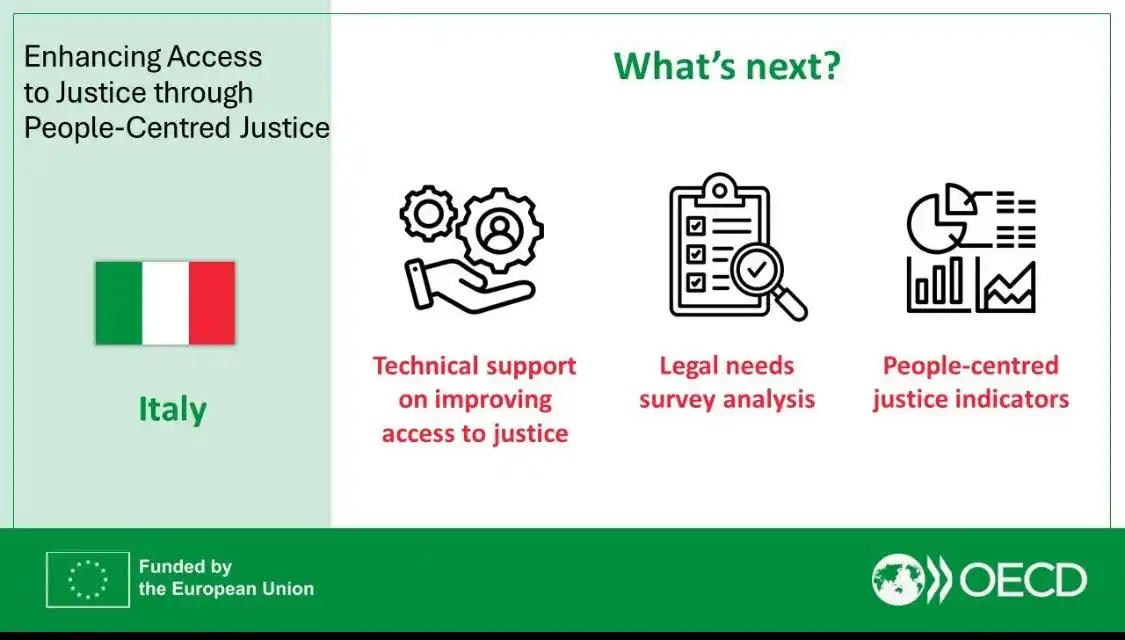

🔵 With great satisfaction, I share the opportunity to participate and contribute to the development of what may soon become one of the leading IP ADR Centres not only in Europe ⚖️💡 🇪🇺 The Unified Patent Court’s Patent Mediation and Arbitration Centre (PMAC) led by Aleš Zalar is launching a public consultation on its draft #Mediation #Rules, aiming to ensure that its framework reflects global best practices and stakeholder needs. 📍 On 8 April 2025, the Expert Committee approved the draft in Ljubljana, Slovenia, and now welcomes feedback from governments, IP professionals, public institutions, and private stakeholders. 📅 Deadline for comments: 21 July 2025 📬 Email: [email protected] 🌐 Documents & details: https://www.unified-patent-court.org/en/court/patent-mediation-and-arbitration-centre 🛠️🔬Let’s shape the future of patent dispute resolution together. #IP #ADR #UPC #Mediation #Innovation #PatentLaw #PMAC #PublicConsultation

📌 Are you a domain name professional, #IP practitioner, or #ADR expert? This overview offers a practical reference for navigating the #URS process. 🔓URS: Meeting the “Clear and Convincing” Evidence Burden in Domain Name Disputes 🎯 When initiating a Uniform Rapid Suspension (URS) proceeding against an abusive domain name, trademark holders face a significant evidentiary challenge: they must prove bad faith registration and use with clear and convincing evidence. ⬇️ Here’s what that really means – and what is required to succeed. 🔑 Three Key Elements to Prove 💪To prevail in a URS proceeding, the complainant must demonstrate all three of the following elements: 1️⃣ Bad Faith Registration Evidence that the registrant knew of the trademark and registered the domain with the intent to profit or cause harm. 2️⃣ Bad Faith Use Proof that the domain is used for deceptive or unlawful purposes (e.g., phishing, counterfeiting, inflated resale offers). 3️⃣ Confusing Similarity The domain name must be identical or confusingly similar to a trademark registered before the domain name was acquired. 📂 What Kind of Evidence Is Required? To meet the “clear and convincing” threshold, the complainant should submit solid documentation, such as: ✔️ Copies of trademark registrations ✔️ Screenshots showing current or intended use of the domain ✔️ Evidence of the registrant’s history of abusive domain name registrations ✔️ Communications or conduct indicating bad faith 🛡️ What Can the Registrant Argue? The registrant may rebut the complaint by demonstrating: ✔️ Legitimate use or demonstrable preparations to use the domain name ✔️ Being commonly known by the domain name (e.g., as an individual or business) ✔️ Use of a generic or descriptive term without intent to mislead ✔️ Use in criticism or tribute that qualifies as fair use ✔️ A valid written agreement between the parties ✔️ No pattern of abusive domain registrations 🔚 Bottom Line 🟠 Under the URS, owning a trademark is not enough – complainants must clearly demonstrate the registrant’s bad faith and meet each required element. 👎 Failure to prove even one element will result in a denial of the complaint, allowing the registrant to retain the domain name. ℹ️ Info: 📧 [email protected] 👩🏻💻 Case Manager: Yana Zhou 🔍 Discover the domains it applies to: https://data.iana.org/TLD/tlds-alpha-by-domain.txt ⚖️ Web: https://www.mfsd.it/sospensione-rapida-domini-generici #URS #Cybersquatting #ADR #DomainNames #TrademarkEnforcement #IPLaw #DisputeResolution #ICANN


⚖️ L’Italia ha mancato il raggiungimento di uno degli obiettivi più importanti previsti dal Pnrr sulla giustizia per il 2024. Si tratta della riduzione dell’arretrato civile: anziché diminuire, come era avvenuto dal 2021 in poi, nel 2024 le pendenze civili presso i tribunali sono aumentate a sorpresa del 3,5 per cento, raggiungendo quota 2.817.759, circa centomila in più del 2023. 🔎qui puoi leggere l'articolo di *Ermes Antonucci* 👇 https://www.ilfoglio.it/giustizia/2025/02/19/news/l-italia-fallisce-l-obiettivo-pnrr-sulla-giustizia-civile-finanziamenti-ue-a-rischio-7434935/

🇦🇲 🇮🇹 🇷🇺 https://www.linkedin.com/posts/resolve-academy-linkedin_it-ai-law-activity-7296573994479046657-peVu?utm_source=share&utm_medium=member_ios&rcm=ACoAAAPAxQIB1Gf2g45imv-lrtzefNLO22zc0_A













